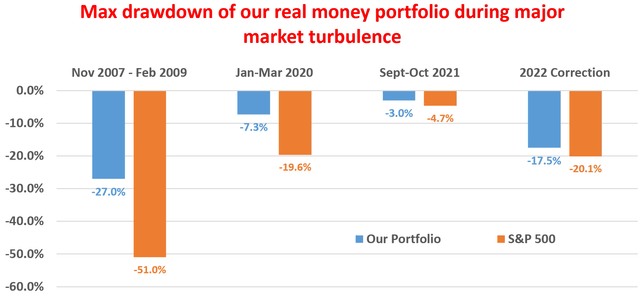Summary:
- Based on its operation losses, CAPEX requirements, and debt obligations, I see a large chance for BA to run out of cash in the next 6~12 months.
- Such cash flow and liquidity issues could trigger a credit downgrade to junk grade in the near term.
- A downgrade subsequently can further increase its borrowing costs, worsen its capital allocation choices, and lead to further stock price declines.
yuriz
BA stock: it’s time to cut your losses
I last analyzed Boeing Company (NYSE:BA) stock about half a year ago. As you can see from the screenshot below, my last article was titled “Boeing: Next CEO’s Problem Is Engineering, Not Management” and was published in April 2024. At that time, the company was still deciding on the CEO transition. I analyzed the potential candidates and argued the challenges will be substantial no matter who gets the job. Quote:
Boeing’s current CEO and other high-level executives are stepping down amid a series of quality issues and management changes. Potential candidates for the new CEO position include former executive Patrick Shanahan and current GE CEO Larry Culp, both highly accomplished professional executives. However, I view the root problem at Boeing as an engineering issue, not a management issue. As such, I have reservations about the likelihood of these candidates successfully restoring its engineering rigor.
Since that writing, a few key developments have materialized. On the management front, Robert ‘‘Kelly’’ Ortberg assumed the CEO role, replacing long-term BA veteran David Calhoun. Before the new CEO can seriously start focusing on the engineering and quality issues I mentioned in my last article, a series of more immediate issues have developed. These issues have worsened the outlook of the company drastically since my last writing in my view. Thus, In the remainder of this article, I will argue for a downgrade of its rating from my earlier HOLD to SELL.
BA stock: credit rating could be downgraded to junk grade
Among the pressing issues (such as the quality issues of its airplanes and the ongoing strike of its workers) facing the new CEO, the biggest and most imminent one on my mind is its cash flow problem, which put its credit rating at risk. For example, S&P Global Ratings is considering downgrading Boeing’s credit rating to junk status based on the following considerations (the highlights were added by me):
We estimate the company will incur a cash outflow of approximately $10 billion in 2024, due in part to working capital buildup to support manufacturing process overhaul and costs associated with the strike. We believe the company will likely require incremental funding to maintain its target cash balance, fund operating and working capital, and meet debt maturities. Therefore, we placed the ratings on Boeing, including the ‘BBB-‘ issuer credit rating and senior unsecured debt ratings, on CreditWatch with negative implications.
Moody’s also indicated in September 2024 that it was considering downgrading Boeing’s rating to junk status. Next, I will walk through BA’s latest finances and explain why I see large odds for such a downgrade. If this scenario occurs, BA will very likely face higher borrowing costs going forward, further choking its cash flow and pressuring its stock prices.
BA stock: a closer look at its finances
To start, BA profits have been deteriorating at an alarming rate in recent quarters due to the issues mentioned earlier. More specifically, its cash flow statement below shows how bad its cash flow from operations has become. As you can see from the statement, cash from operations was extremely erratic in the past 2~3 years. The company ended 2023 with a positive cash flow of $3,381 million in the fourth quarter. However, the figures have turned red in 2024, with a negative flow of $3,362 million and $3,923 for the first two quarters. In the meantime, the company has to spend around $400 to $500 million on capital expenditures to keep its ongoing operation.
To further compound the cash flow issue, BA’s debt has risen sharply in the recent quarters as you can see from its balance sheet below. In the past 12 months alone, its long-term debt has increased from $47.4 billion in June 2023 to the current level of $52.9 billion. As a result, its interest expenses have climbed up in tandem. To wit, its interest expense totaled $621 million in the June quarter of 2023 and has increased to $673 million in the most recent quarter as seen.
Thus, if you add up the numbers above, the company suffered about $5B of cash outflow in the past quarter (a negative $3,923 million from operations, a negative $404 million from capital expenditures, and a negative $673 million for interest payments). Looking ahead, as the strike continues, I expect the cash outflow to further worsen in the months ahead.
Now, the current portion of its long-term is about $4.7 billion as seen in the balance sheet above. Thus, as a very crude estimate, the company also has to either repay this amount in the coming 12 months or refinance it. The refinancing option seems very unlikely – or at least a very bad choice – in my view given its already elevated debt-burned and cash flow problems. If the company chose to repay the debt, it would quickly deplete its cash (around $12.6 billion as of June 2024) when combined with the other cash outflows just mentioned.
All told, I thus see large odds for BA to suffer a credit downgrade in the near term (say the next 6~12 months), which could further increase its borrowing costs, limit its capital allocations, and hinder its recovery plan – all leading to further stock price declines.
Other risks and final thoughts
In terms of upside risks, the company has a pending acquisition of Spirit AeroSystems. Spirit AeroSystems is a fuselage maker, and I expect the acquisition to help BA to get a better handle on quality control and the supply chain. In the meantime, the certification processes for its upgraded 737 and 777 models are also progressing. If the certifications are all successful, they could help the deliveries as soon as 2025.
Finally, there is also a possibility that BA can raise cash in the near future to avoid a downgrade. According to this Seeking Alpha news, BA is “weighing how to raise cash through a sale of shares and equity-like securities as the aviation giant seeks to avoid a downgrade of its credit rating to junk status, Reuters reported Wednesday, citing people familiar with the matter”. However, even if BA does manage to raise a sufficient amount of cash (at least $10B based on my above estimates of its anticipated outflows) and avoid a downgrade, I do not really consider this scenario as a positive development. Under its current conditions, the issuance of more shares and/or equity-like securities could come at very unfavorable prices/terms and can be very detrimental to staying shareholders.
To conclude, my thesis is that the negatives outweigh the positives under current conditions. Several of the upside risks mentioned above are more oriented towards the longer term. However, as argued above, I am very concerned about the finances of the company in the next 6~12 months. Based on its operation losses, capital requirements, and debt obligations, I see a large chance for the company to run out of cash in this timeframe and face very difficult financing and operating choices.
Analyst’s Disclosure: I/we have no stock, option or similar derivative position in any of the companies mentioned, and no plans to initiate any such positions within the next 72 hours. I wrote this article myself, and it expresses my own opinions. I am not receiving compensation for it (other than from Seeking Alpha). I have no business relationship with any company whose stock is mentioned in this article.
Seeking Alpha’s Disclosure: Past performance is no guarantee of future results. No recommendation or advice is being given as to whether any investment is suitable for a particular investor. Any views or opinions expressed above may not reflect those of Seeking Alpha as a whole. Seeking Alpha is not a licensed securities dealer, broker or US investment adviser or investment bank. Our analysts are third party authors that include both professional investors and individual investors who may not be licensed or certified by any institute or regulatory body.
As you can tell, our core style is to provide actionable and unambiguous ideas from our independent research. If your share this investment style, check out Envision Early Retirement. It provides at least 1x in-depth articles per week on such ideas.
We have helped our members not only to beat S&P 500 but also avoid heavy drawdowns despite the extreme volatilities in BOTH the equity AND bond market.
Join for a 100% Risk-Free trial and see if our proven method can help you too.




